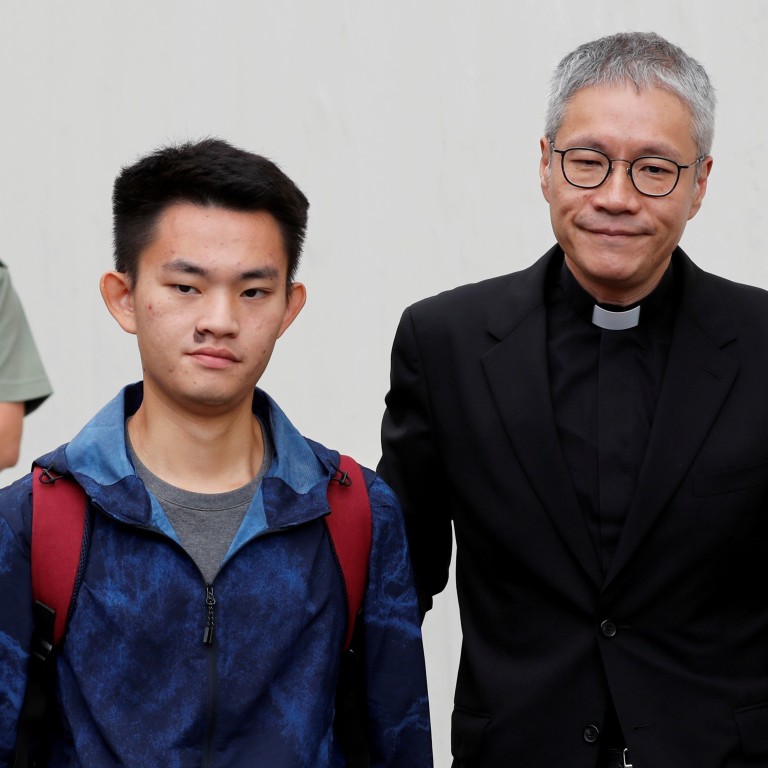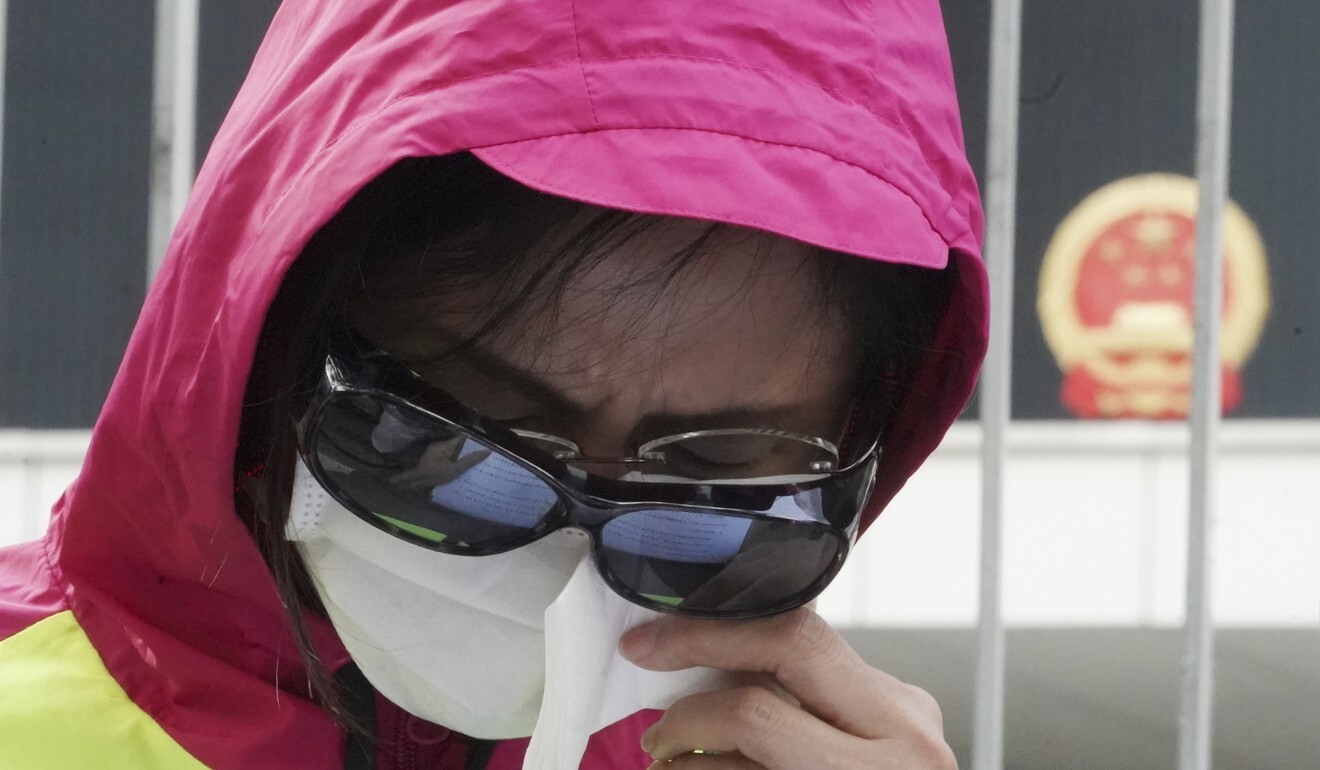
One year on, Hong Kong and Taiwan’s tug of war over murder suspect who sparked extradition bill furore has no end in sight
- Taipei’s insistence on ‘government-level exchange’ as a precursor to transfer, means impasse unlikely to be broken, vice-chair of Beijing think tank says
- But opposition lawmaker urges both sides to ‘sit down and talk’, saying even meeting without achieving consensus better than arguing ‘via microphone’
It is a murder case where no jurisdiction seems to want the killer.
Chan Tong-kai – the Hong Kong murder suspect wanted in Taiwan, where he allegedly killed his pregnant girlfriend, Poon Hiu-wing – has been stuck in his hometown for a full year despite publicly declaring his willingness to surrender himself to authorities on the self-ruled island.
Chan was released from prison in Hong Kong one year ago today after serving a sentence for offences related to illegally using money belonging to Poon after fleeing home in 2018, the only charges the city had jurisdiction to pursue. He has been living in a police-operated safe house ever since.
Hong Kong and Taipei have since clashed repeatedly over how Chan should be transferred across the strait to face his murder charge. While Hong Kong has said Chan is free to surrender himself, but cannot be forced to do so, Taipei has demanded he be processed through “official” channels, and has asked to hold talks with local authorities to sort out the extradition arrangements.
Earlier, the Taiwanese authorities, in an apparent concession, announced Chan could apply for a visa at the Taipei Economic and Cultural Office in Hong Kong. But when Reverend Canon Peter Koon Ho-ming, an Anglican priest who has been assisting Chan, went there to apply on his behalf, he was told the office was not ready yet.
The Taiwan side obviously wants to take advantage of the case to force Hong Kong to have a government-level exchange with them
The Post learned on Thursday that Taiwanese authorities are requiring police officers from both sides first sit down to exchange evidence and sort out Chan’s travel details before processing his application. But Hong Kong Secretary for Security John Lee Ka-chiu has already ruled out the possibility of legally passing over any evidence.
While Poon’s mother has set Friday as her personal deadline for Chan to surrender to Taiwanese authorities, Koon, the reverend, declined to discuss what the wanted man’s next step would be.
“The most important thing now is for Chan to be able to get an entry permit [to Taiwan],” the priest said. “His legal representative there has been working on it. We hope to be able to see some progress.”
Some analysts warned a political crisis could erupt if the Hong Kong government did not handle Chan’s case carefully.

Professor Lau Siu-kai, a vice-chairman of the Chinese Association of Hong Kong and Macau Studies, a semi-official think tank based in Beijing, said: “I can hardly see how the current impasse can be broken. Both sides simply do not share a common goal.
“The Hong Kong side hopes Chan can return to Taiwan to face trial and bring justice to the victim and her family. The Taiwan side obviously wants to take advantage of the case to force Hong Kong to have a government-level exchange with them.”
Any move giving the appearance of Taiwan being treated as a sovereign state would be a non-starter given the fact the Chinese government considers the island a renegade province.
Earlier this month, Taiwan’s premier, Su Tseng-chang, suggested Chan would have to be handed over officially. Su said he would not let Chan visit Taiwan on an “independent tour”.
Taiwan insisting on meeting with Hong Kong police before arranging visa for murder suspect, sources say
“We will never allow a murder suspect to come and go freely,” he said. “If the suspect wants to face trial [in Taiwan], the governments of the two sides should sit down and talk.”
Last October, Taiwan floated the idea of sending police to Hong Kong to bring Chan back.
But the Hong Kong government rejected that as “cross-jurisdiction law enforcement” and “a disrespect for Hong Kong’s jurisdictional power”.
Taiwan’s Mainland Affairs Council has repeatedly noted it had established a special “single-window” mechanism to liaise with Hong Kong and facilitate the handover. But Hong Kong’s Security Bureau denied such a channel of communication existed.
Lee, the security chief, has offered to handle the case with Taiwan through a “cooperation mechanism” between police in the two places, but only on the condition that Taipei officially grants a visa for Chan to go.
Professor Lau said: “The government should make more of an effort to explain to the people that Taiwan’s demands are unreasonable or unworkable. Otherwise, people might get the impression it is the Hong Kong government that is reluctant to help bring Chan to justice.
“With the tense Taiwan-mainland relations since the Democratic Progress Party took power in Taiwan, the case would certainly be used as a pretext by the [President] Tsai Ing-wen government to say how Hong Kong had done badly under Chinese rule and how the ‘one country, two systems’ policy does not work.”
Hsiao Tu-huan, a researcher at the Centre for Cross-Strait Relations at Tamkang University in Taiwan, also believed it was unlikely Chan would be able to fly to Taiwan in the next few months to turn himself in.
“Taiwan and the Hong Kong government have been divided over the city government’s role in Chan’s trip to Taiwan,” he said. “From a political perspective, both sides see no grounds for making concessions on this issue.”
Both sides should sit down and talk, say what Taiwan wants and what Hong Kong can or cannot do under the law
Hsiao, who is familiar with the relationship between the cross-strait neighbours, said Taipei insisted Chan could only fly to the island through mutual legal assistance provided by the two governments.
In the wake of the unrest over last year’s since-discarded extradition bill, the Hong Kong government also could not afford to repeat its handling of a murder case in 2016, when suspects who fled to Taiwan from the city were deported for overstaying their visas and handed over to officers from the financial hub at Taipei’s Taoyuan International Airport.
They remained under Hong Kong police surveillance throughout their flight and were arrested upon landing.
“If the Hong Kong government agrees to hand Chan over to officers from Taiwan at Hong Kong International Airport, it could hardly justify why there was a need to press ahead with the extradition bill last year to allow the transfer of criminal suspects to jurisdictions with which Hong Kong lacks a deal, including Taiwan,” Hsiao said.

Hsiao said the Hong Kong government’s refusal in September 2019 to renew the work visa of Tsai Meng-chieh, a deputy section head of the Taipei Economic and Cultural Office, also made coordination over Chan’s surrender more difficult.
Tsai, who is a criminal investigator from Taiwan’s Ministry of Justice, was the man responsible for liaising with Hong Kong’s law enforcement agencies. His position at the Taipei Economic and Cultural Office has been vacant since his departure last year.
Hong Kong-based China watcher, Hui Ching, research director of the Hong Kong Zhi Ming Institute, a policy think tank, shared similar views.
“The people, as well as the political circles, in Taiwan do not really care much about Chan’s case. To them, the killer is a Hongkonger, the victim was also a Hongkonger. There is no big pressure on the Tsai government to bring Chan to trial there. That can explain Taiwan’s could-not-care-less attitude.”
Reverend seeking to file visa application on behalf of murder suspect snubbed by Taipei’s local office: source
But Hong Kong lawmaker James To Kun-sun, of the opposition Democratic Party, saw no harm for both governments to hold talks. He asked the Hong Kong government to proactively reach out to Taiwan, rather than arguing “via microphone”.
To said: “Both sides should sit down and talk, say what Taiwan wants and what Hong Kong can or cannot do under the law. Even if no consensus can be reached in the end, at least both sides will have met to discuss rather than criticising each other while refusing to make any contact.”
The whole saga started with what should have been the couple’s romantic getaway to Taiwan for Valentine’s Day in 2018. Poon, 20, would never return home. She was killed during the trip, allegedly by Chan, then 19 years old.
Chan has since been wanted in Taiwan in connection with Poon’s death. He fled back to Hong Kong, but was arrested in March 2018 by Hong Kong police for illegally using funds belonging to Poon. He was subsequently sentenced to 29 months’ prison in April 2019.
Mother of victim in murder case calls on Hong Kong security chief to boot suspected killer from safe house
Not long after, Hong Kong Chief Executive Carrie Lam Cheng Yuet-ngor used the high-profile murder case to propose an amendment to Hong Kong’s extradition law, which would have allowed case-by-case fugitive transfers to jurisdictions with which Hong Kong had no prior agreement, including Taiwan, Macau and mainland China.
The bill would have resolved the legal impasse in Chan’s case, but was met with fierce opposition from a public that feared the amendment would lead to Hong Kong residents being sent to the mainland for trial.
It was eventually shelved, but not before sparking demonstrations that grew into a broader anti-government movement accompanied by months of violent clashes between protesters and police.
Due to good behaviour while in prison, Chan ultimately spent only about six months in jail after sentencing, on top of 13 months in custody beforehand.
Speaking to the press after his release, Chan apologised to Poon’s parents and the public and said: “I am willing, for my impulsive act and things I did wrong, to surrender myself to Taiwan to face sentencing.”
One year later, both the murder victims parents and members of the public are still waiting.



